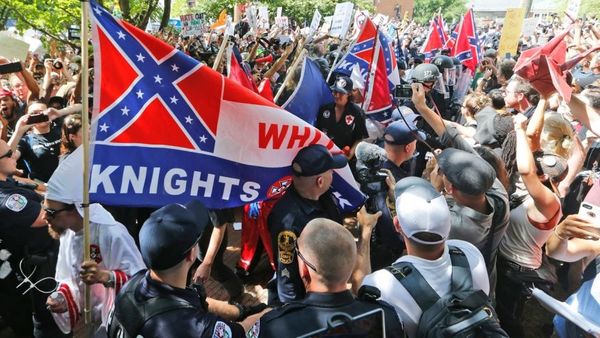
Is racism sufficient cause to fire someone from their job?
In the wake of the August 12 white supremacist rally in Charlottesville, Virginia, in which three were killed and dozens injured, that’s the question buzzing in the brains of employers all over the country.
A new report from the Society for Human Resource Management points out that it’s a disturbing realization for an employer that an employee has taken part in a white supremacist rally — particularly in the case of deaths and injuries.
From there, it’s a logical progression to wonder whether that employee can be fired.
And it’s not a clear-cut answer, according to the report.
While there’s no federal law that would prevent such a termination, according to Michael Eastman, an attorney with the Center for Workplace Compliance (formerly the Equal Employment Advisory Council) in Washington, D.C., there could be state laws that stand in the way of shedding a white supremacist employee who has voiced beliefs that other employees find offensive.
A National Law Journal report says at least one man has been fired as a result of his participation in the “Unite the Right” rally and counter-protest.
According to a Washington Post report, a Twitter user identified the white supremacists and self-identified Nazis at the rally in an effort to make them face the consequences of their actions in their home towns, including job loss, if employers learn of their activities and choose to disassociate themselves. The first person so identified was fired.
The NLJ report points out that “[e]mployers trying to decide how to cope with a white supremacist or someone holding other discriminatory views have to consider their jurisdiction and the nature of the employee’s speech and affiliation.”
While political views are not a protected class under federal Title VII civil rights protections, unlike such factors as race, sex or religion, some local governments — including Washington, D.C., Puerto Rico, the Virgin Islands and Wisconsin — do protect employees’ political affiliations.
And while government employees have a right to free speech — employees in the private sector, not so much — there’s a limit to what they can say in the workplace.
A boss seeing an employee engaging in a demonstration such as the one in Charlotteville can probably take action against that employee without repercussions.
The report quotes Richard Cohen, an employment attorney with FisherBroyles, who says, “If an employer is watching television news — like what happened [in Charlottesville] — and sees one of his or her employees on either side of the barricades, there is nothing that protects those workers, unless they fall into another protected class.”
Cohen said employees may be able to use the loophole of defending speech, even if racist, sexist or discriminatory, under Title VII simply because it has to do with a protected characteristic.
That said, “an employer could act on an employee taking on discriminatory behavior if the views would be harmful to other workers and constitute a violation of Title VII.”
In the report, employment attorney Matthew Feery, with Much Shelist, in Chicago, says that this is not an “either side” issue for most employers; instead, it’s pretty clear cut, with a right side and a wrong side.
Feery says, “Apart from the legal issues involved, employers should consider the effect of their decision — or nondecision — on their workforce and business operations.”
He adds, “Employers understandably may decide that the potential liability from termination may be outweighed by the practical effects of retaining the employee in question, especially with respect to employee morale, workplace harmony and the employer’s reputation.”
Originally published on BenefitsPro. All rights reserved. This material may not be published, broadcast, rewritten, or redistributed.


